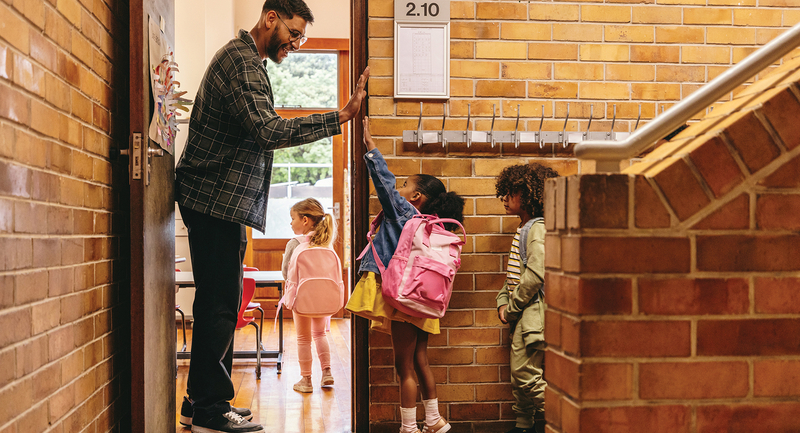To build healthy relationships with black and Latino male students, we must know who they are, both in and out of school.

Premium Resource
When you tune in to the news or read the newspaper, it seems that most stories pertaining to black and Latino males are filled with bad accounts. In the United States, black and Latino males lead the nation in many negative statistical categories, including incarceration, death, unemployment, and high school dropout rates (Davis, 2011). A large proportion of black and Latino male children live in poverty, in violent neighborhoods where they see little hope of pulling themselves out of the cycle of failure. Unfortunately, many educators who work with these students also doubt that these youth will succeed.
The first thing you need to know is the truth: 9.1 percent of black male students are in special education compared with the national average of 6.5 percent; 14.5 percent of black males are in honors classes compared with the national average of 25.6 percent of all students (Toldson, 2012). We can look at these figures and focus on the fact that black males as a group lag behind other student groups. But we can also look at the figures another way, realizing that there are more black males in honors classes than in special education. Black and Latino male students can succeed—and they are succeeding every day.
Where would I be if I had accepted the stereotypes, labels, and statistics that were placed on me as a black male by educators who were supposed to guide me to success? Shortly after my best friend was murdered at age 15, one of my teachers told me that I would end up in jail or dead before I turned 21. That harsh statement was tough to swallow when I was already struggling with the loss of my friend. The only way I could focus on my academics for the rest of that semester was to tune her out. It's tough for students to learn from educators who they feel don't care for them. I can honestly say that I learned absolutely nothing from her. Fortunately, I used her damaging words to fuel my determination—I dug into the books myself, studied hard, and passed her class to prove her wrong.
This teacher did have a point, however. Everything was set up for me to fail, not succeed. The playing field wasn't even back then, and it still isn't today (Cook, 2015).
Like many black and Latino males, I was born into adversity. I never met my biological father. Growing up in a poor, single-parent home in the inner city presented many challenges. I was bullied and picked on daily. Getting to the bus stop safely was a trial in itself because of the potential of being robbed or killed by gang members.
Sometimes we had to use our oven to warm our house in the winter because we didn't have money to pay the heating bill. Dinner was often whatever we could piece together. My stepfather was abusive physically and mentally, and he would go weeks without saying a word to me. By the time I got to school most mornings, I was mentally drained, my spirit was damaged, and I felt that no one understood or cared.
Educators at my school had no idea what I had to face every day; their lack of awareness caused an immediate communication barrier. This same issue limits relationships between educators and black and Latino male students today.
When I entered 5th grade in the mid-1980s, I was bused to an all-white suburban school as part of the school integration movement. Adjusting to that school was tough; no one had prepared either the black students or the white students for the culture shock. On the first day of school, the other black kids and I were met with parents yelling the "N" word and protesters screaming. Police cars were everywhere. This was my first brush with racism.
Even worse, it was obvious early on that the teachers didn't understand me, nor did they seem to want to. The school administrators apparently assumed that the kids who were bused in were all below average; every black student from my neighborhood was placed in remedial classes, where we had to test our way out. Mentally it broke down a lot of students; eventually they would quit. For me, it made me angry. How dare anyone assume I couldn't keep up with the other students, just because I was from the inner city? I tested my way out of those classes, proving that I was just as worthy of being there as the rest of the students.
I wanted to be successful. I just didn't know how to get there. My mom had struggled just to get her GED; I couldn't talk to her about college because she had never gone. Although I made good grades, I was suspended from school several times. I admit that a few of those suspensions were justified, but sometimes they happened because educators judged me unfairly before they got to know me as a student. One time I was suspended because an educator said I looked at her the wrong way. What does that mean? What she didn't know was that maybe I was hungry. Maybe I had been abused the night before. Maybe I was sleepy from waiting up for my mom to get home from her night job. It's hard to find out what a student is dealing with if you don't take the time to ask.
Teachers often made sarcastic and racist comments. One teacher asked, "Do black people take baths?" and started laughing. As the only black student in the classroom, I felt insulted and belittled.
It still stings when I think about the unequal treatment I experienced. Mine is just one story out of thousands of other low-income black and Latino male students who are not understood and therefore are isolated or degraded. This happens because many educators fail to understand or relate to their students.
It's a simple concept, but one that is too often overlooked. Building relationships with students is the key to their success. Our goal as educators should be to educate, activate, and motivate our students regardless of their background. Otherwise, we fail them.
How do we build healthy relationships with black and Latino male students? We must know who they are, both in and out of school. We must take the time to explore not only their test scores, but also information like family dynamics (incarceration, homelessness, abuse, hunger), strengths and weaknesses, emotional well-being, speech problems, and other obstacles affecting their success. Here are additional suggestions to help bridge the gap.
When your students express their thoughts, pains, or concerns, listen without distraction and without judgment. You may find that some kids are dealing with serious issues at home. Even when their concerns are minor, the empathy you display will go a long way in determining how they will perform in your class. By practicing active listening, you let students know that you really care about them, thereby gaining their trust and making them more eager to learn from you.
I have learned so much from my students by simply listening to them. Eighteen years ago, one of my student athletes approached me. This young man was broken and had low self-esteem. His perception of himself, especially as a student, was negative. I listened to him tell me about his family dysfunction, including an absent father and lack of support for his dream of going to college. He said he always felt better talking to me just to get things off his chest. I told him that his current situation wasn't his final destination. Today, he is a successful college graduate employed by a university. He still calls or texts me twice a week, but now our conversations are positive—about raising children, relationships, and his work mentoring other students. It makes me feel good to see him pay it forward.
Treat every student fairly. What does being fair look like? It means that you are impartial and you hold all students under your leadership to the same rules. It's tough to build relationships with students who feel they're being treated unjustly. When you and your students set rules, everyone must abide by them. If you have a rule of no cell phones or texting, that rule should apply to all students. If you are ever in doubt about your discipline choices, ask yourself if you would treat your own child that way.
As a track coach at the high school level, I had a close relationship with my athletes, who trusted me enough to lean on me for guidance and advice. At the same time, I was known as a firm teacher and coach. At times, my athletes would try to get special privileges like showing up at my classroom unannounced and asking for a pass to another class for which they were late. Although it was tempting, I had to hold them accountable for their actions, just as I did with other students. I not only refused to give them a pass, but I also gave them laps to run after practice for being late. At the time, it was tough for them to understand, but eventually they respected the fact that I held them accountable.
Healthy communication means connecting with trust, intimacy, and respect so that you know students and they know you. Let your students see that you're not perfect. Let them know you made mistakes along the way, and tell them how you overcame those mistakes. You can't teach students to learn from their mistakes if you never share your own. The more transparent you are, the more students will trust you.
For example, one of my students was having a tough day and said, "My life wouldn't be so bad if my dad would just come by the house and visit me and my siblings." I shared with him that I used to sit on my steps for days at a time waiting for my dad to come by and pick me up, but he never came. I would sometimes have angry outbursts that I would blame on my father's absence, but my anger got me nowhere fast. I told him I understood his pain, but his father's dysfunction didn't have to be his—he could rewrite his story like I did. Almost 20 years have gone by since we had that conversation. The last time we spoke, he shared with me that he had rewritten his story. He's married now with his own family.
When judging someone, we often fall back on mental models, which are thinking patterns established by past events, experiences, and messages we receive in the media. These models serve as filters through which we respond to the world. They shape what we see and hear, what we feel, and what we do. Unfortunately, mental models can give birth to stereotypes. We all respond to situations and people based on our mental models, which are often invisible to us.
That's why it's important to stop and ask yourself, "Is there a possibility that I could be wrong?" If your unconscious mental model tells you that black and Latino males aren't capable of being successful students, it will affect how you respond to them and they will perceive your low expectations. We cannot lower our expectations for our students at any time. Every student has the potential to succeed. No matter what their home situation is or how they dress or look, we must view every student as a potential success.
For example, because many of my students had trouble reading at grade level, I began having open reading sessions in my classes. Some students would get upset because they were embarrassed that they struggled to sound out words. I had to stop students from making fun of one another. I explained that if they wanted to compete with the rest of the world for their education and future employment, they would have to work on it until they got it right, so I set high expectations instead of feeling sorry for them. I shared with them that I had had the same problem reading, and I had to spend extra time sounding out words until I got it right. I was not going to let them just skate by—I was going to challenge them to do better. We continued to read aloud, and every young man improved.
Discipline is essential for all students, but it has to be the right kind. Three mistakes are especially harmful to black and Latino male students. The first is using sarcasm. Sarcasm is the last thing that a young person coming from a tough background needs to hear. A sarcastic remark may make the educator feel superior, but it can only make the target of the remark feel inadequate.
Second, I've observed many educators showing anger when they have conflicts with students, and the results are never positive. There's a difference between being angry and being firm. What our black and Latino male students need is an understanding teacher who doesn't take their behavior personally, but instead responds with empathy and calm during high-stress situations.
Third, make every effort to keep students in the classroom instead of sending them to the principal or suspending them. When students would come to my classroom late, I would give them the choice to do push-ups or sit-ups so they wouldn't have to leave class to get a late pass and miss the first part of the lesson. At the same time, they got the message that their actions had consequences.
Whatever form of discipline you use, do it with care and concern for the student. Many students have serious emotional issues that are not being addressed. To build healthy relationships, you must let students know that even if they make a terrible mistake or decision, you still believe in them and their ability to bounce back and make better choices. That will go a long way toward building better relationships with them.
Many low-income black and Latino males I come into contact with feel broken, underappreciated, unimportant, and unequipped to succeed. They feel that educators not only don't expect them to do well, but also don't put forth effort to help them grow.
But poverty doesn't have to mean "at risk." Many young people who grew up in poverty have become successful doctors, lawyers, business owners—and teachers. Beneath their exterior, these young men want to be educated just like any other student. They are hungry to learn. They just need educators with empathy who care enough to build relationships with them.
References
•
Cook, L. (2015, January 28). U.S. education: Still separate and unequal. Retrieved from U.S. News & World Report Data Mine
•
Davis, L. M. (2011, September 13). Dropping out, imprisoned or killed: Disparities in outcomes faced by young African American men. Retrieved from Tavis Smiley Reports
•
Toldson, I. A. (2012, August 17). Black reading skills: Reports miss the mark. Retrieved from The Root








